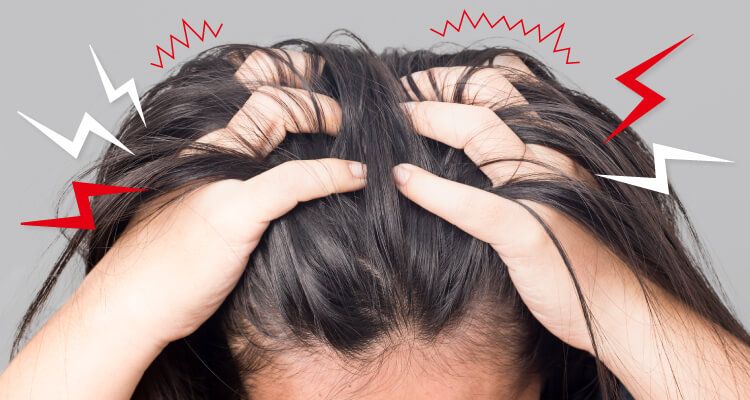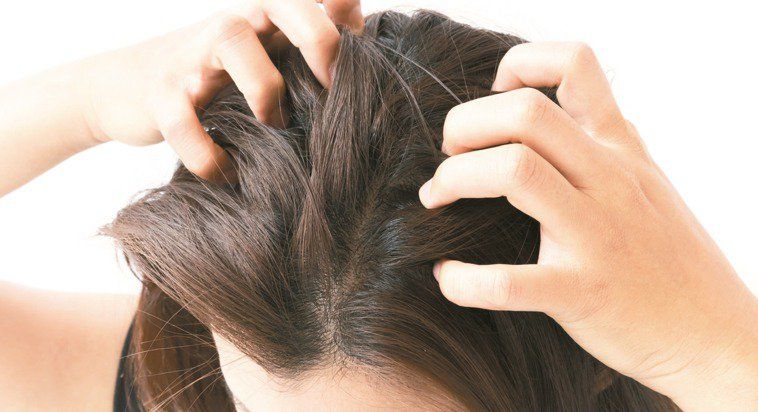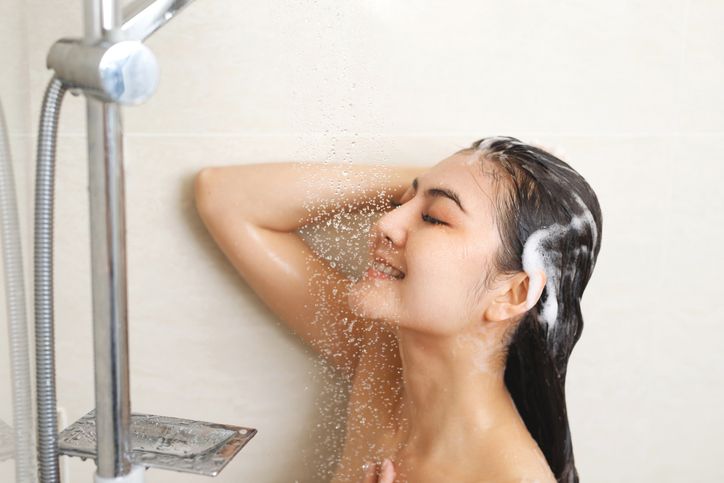
- Home
- Trend
- Weight Loss Strategies
- Acne Tips
- Hair Health Information
- Blemish Removal Tips
- Acne Scar Removal Tips
- Muscle Building Techniques
- Intimate Care Tips
- Postpartum Intimate Care
- Eye Bags Wiki
- Tips for Face Slimming
- Secret of Permanent Hair Removal
- Breast Enlargement Tips
- Cure to Snoring
- Marionette Lines
- Skin-Tightening Secrets
Scalp eczema is a much more serious issue than many people realize. It causes intense itchiness, accelerates dandruff buildup, and in severe cases, can even lead to hair loss—definitely not something to ignore. Compared to other parts of the body, scalp eczema is less common, so you might not encounter it often. But what happens when eczema develops on a scalp filled with hair and follicles? And is it related to fungal infections that cause scalp itchiness? Let’s explore what scalp eczema really is and how to manage it effectively.
What Is Scalp Eczema and What Causes It?

Scalp eczema, also known as seborrheic dermatitis, refers to inflammation of the scalp. It typically appears as red, scaly rashes along the hairline or under the hair and is often accompanied by intense itchiness, making it particularly distressing for those affected. To avoid scalp eczema, it's crucial to first understand its root causes.
Cause 1: Abnormal Sebum Production
One common cause is excessive sebum secretion. The scalp has a high concentration of pores and active sebaceous glands, which creates a favorable environment for fungi. These fungi break down excess oil, triggering inflammatory reactions and producing toxins that irritate the skin—leading to itchiness, flaking, and even hair loss.
Cause 2: Irritating Hair Products and Frequent Dyeing or Perming
Shampoos or styling products with an imbalanced pH or harsh chemicals can irritate the scalp. This may lead to inflammation or, in severe cases, eczema. Incorrect shampooing techniques, environmental triggers like UV rays, or dry air can also worsen scalp conditions.
Cause 3: Poor Diet and Lifestyle Habits
Beyond sebum issues, deficiencies in vitamin B2, hormonal imbalances, and chronic stress are all contributing factors that can lead to scalp inflammation and eczema.
3 Key Symptoms of Scalp Eczema—Check If You Have Them

Scalp eczema usually shows up as sticky dandruff, itchy scalp, flakiness, and rough patches. In more advanced cases, small wounds may form. If left untreated, the itching can become unbearable, and dandruff buildup gets worse.
Symptom 1: Itchy, Red Scalp with Flaking When Scratched
Allergic reactions from inappropriate shampoos or styling products can cause redness and itching. Scratching may worsen the inflammation and increase dandruff, affecting your appearance. Always check for product ingredients that may trigger allergies and avoid known irritants.
Symptom 2: Oily, Itchy Scalp with Sticky Dandruff
Excess oil feeds Malassezia fungi on the scalp, which release toxins that inflame the skin. Although you can't test for Malassezia on your own, keeping the scalp clean and using antifungal shampoos helps. Avoid aggressively scrubbing your scalp or consuming oily, spicy foods that boost oil production.
Symptom 3: Dry, Itchy, Purple-Red Patches with Flaky Dandruff
Many people think strong, clarifying shampoos will solve the issue—but over-cleansing strips away natural oils and worsens dryness and itchiness. This compromises the skin barrier and leads to more inflammation. Gentle, soothing shampoos are recommended, and if symptoms persist, consult a scalp specialist.
免費體驗
F8 Hair Regrowth Treatment
1 Minute Self-Registration
Date should not be before minimal date
When Do Scalp Fungi Multiply More Easily?
Fungal growth on the scalp thrives in hot, humid, and stuffy conditions. People who sweat a lot or frequently wear hats are more at risk. Fungi can also spread through close contact with infected individuals or pets like cats and dogs.
How to Improve Scalp Eczema: Shampoo Routine Tips
Improper hair-washing habits can lead to scalp eczema. Below are three practical hair care steps that promote scalp health and help relieve eczema symptoms:
Step 1: Massage Your Scalp with a Brush Before Shampooing
Air pollution and environmental grime build up throughout the day, especially for women with long hair. Before shampooing, use a brush to loosen dirt and dead skin, which also helps stimulate blood flow and awaken hair follicles.
Step 2: Deep-Cleanse the Scalp Gently
Choose shampoos free of harsh chemicals, artificial colors, and fragrances. Avoid alkaline formulas that can disrupt the scalp's natural balance. Opt for mild, nourishing shampoos that cleanse while caring for the scalp.
Step 3: Nourish the Scalp with a Treatment Essence
Scalp serums or essences help maintain a healthy environment for hair growth, strengthen hair roots, and reduce breakage. Look for ingredients like copper peptides, which are known to support scalp health.
Lifestyle Habits That Worsen Scalp Eczema
Beyond shampooing, daily habits also play a major role in scalp health. Here are three damaging lifestyle practices to avoid:
Bad Habit 1: Spicy, Oily Diet and Poor Sleep Routine
Spicy and greasy foods like fried snacks, meats, seafood, and pungent herbs can overstimulate oil glands and clog pores. Staying up late and chronic stress also disrupt hormones, increasing the risk of scalp eczema and hair loss.
Bad Habit 2: Improper Use of Hair Treatments
Conditioners and hair oils are meant for hair strands, not the scalp. Applying them directly to the roots can clog follicles, especially when combined with environmental pollution and individual sensitivity. Always rinse thoroughly and avoid applying products directly to the scalp.
Bad Habit 3: Using a Hair Dryer That’s Too Hot
Overheating with a blow-dryer can damage hair cuticles and scalp follicles. Keep the dryer temperature between 50–60°C and hold it at least 15 cm away from the scalp.
免費體驗
F8 Hair Regrowth Treatment
1 Minute Self-Registration
Date should not be before minimal date
Medical Treatments for Scalp Eczema
As fungal overgrowth is a major trigger, managing it is key. Aside from regular scalp cleansing and blow-drying after shampooing to reduce moisture buildup, topical or oral antifungal medications may be required in severe cases. Medicated shampoos and creams are common, but oral antifungals tend to be more effective.
Can Silicone-Free Shampoos Help with Scalp Sensitivity or Eczema?
Let’s clarify: silicone in shampoos is mainly used to smooth and repair damaged hair, like filling in cracks with cement. While it helps with moisture retention, studies show that silicone can weigh down the hair, cause flatness, and potentially clog follicles. The bigger concern, however, is skin sensitivity. Some users report irritation after using silicone shampoos.
That said, silicone isn’t a common allergen. During shampooing, exposure to silicone is minimal—both in duration and concentration. Therefore, it’s unlikely to clog follicles or worsen sensitivity. Switching to a silicone-free shampoo might not significantly help with scalp acne or eczema.
Editor’s Review: I Tried a Free Laser Treatment for Scalp Eczema—Did It Work?
Every time the weather turns humid—whether in summer or winter—my scalp starts itching badly. Eczema flares up, and I often scratch in my sleep, leaving dandruff all over my pillow and under my nails. Looking in the mirror, my scalp was red and swollen. Even using eczema shampoos and allergy meds didn’t help much. Worse, I started losing more hair.
That’s when I decided to try the Perfect Medical F8 Hair Regrowth Treatment—especially since the first trial was free!
This laser treatment is designed to improve scalp circulation and reduce inflammation, making it ideal not just for regrowth but also for restoring scalp health. During my visit, the consultant examined my scalp using a professional scanner. While the redness and dandruff were quite serious, the follicles were still healthy, and I wasn’t yet losing a lot of hair—though repeated inflammation was beginning to trigger shedding. She recommended I start laser or scalp treatments as early as possible.
The F8 treatment is non-invasive and painless, like a skincare laser facial. The laser is applied to the scalp for 15–20 minutes—longer isn’t better. Afterward, a medicated serum is applied to soothe, hydrate, reduce inflammation, and prevent hair loss. It felt like a cool rinse for the scalp!
After just one session, the most noticeable result was the immediate reduction in itchiness and redness. My scalp looked healthier, and the tight, irritated feeling disappeared. Of course, one session isn’t a cure—you need consistency. Doing the treatment once a month and keeping up with daily hair care is essential.
I’ve now included F8 laser therapy as part of my regular scalp care routine. Perfect Medical is still offering free trial sessions. Click the link below to register and receive a complimentary scalp analysis and treatment! Delaying care can lead to more serious hair loss, so it’s best to start addressing scalp health early.
Try it Today: Perfect Medical F8 Hair Regrowth Treatment免費體驗
F8 Hair Regrowth Treatment
1 Minute Self-Registration
Date should not be before minimal date
FAQ

What causes scalp eczema?
One of the causes of scalp eczema is excessive oil production by the skin. Due to the dense distribution of pores on the scalp, the secretion of sebum and sweat is quite active, which can easily lead to the growth of fungi on the scalp. These fungi break down excess sebum, triggering inflammation and producing toxins that irritate the skin, causing itching and even leading to hair loss problems.
What are the symptoms of scalp eczema?
Some scalp eczema patients believe that using strong cleansing shampoos can wash away the oils. However, this is a misconception, as over-cleansing strips away natural oils, making the scalp drier and worsening the itchiness, further aggravating the eczema. Additionally, the skin’s protective barrier weakens, making it more prone to irritation and inflammation. Therefore, even if you have scalp eczema, it’s recommended to use mild, gentle shampoos to reduce irritation. If symptoms worsen, it’s best to consult a scalp care expert for appropriate treatment.
How can we improve scalp eczema through shampooing?
Step 1: Comb and Massage the Scalp Before Shampooing: Due to air pollution, the scalp accumulates dust and oils throughout the day. Long-haired women, when loosening their tied hair, may feel scalp tightness or other discomforts. It’s recommended to comb through the hair before washing to remove dust and oil, while also massaging the scalp to promote blood circulation and energize the hair roots. Step 2: Deep Cleanse the Scalp: Shampoo plays a crucial role in scalp care. As mentioned earlier, using an alkaline shampoo can harm the health of your scalp. When choosing a shampoo, make sure to look for products that are free from fragrances, dyes, and are low-irritation. These shampoos will nourish both the scalp and hair roots while providing care during washing. Step 3: Use Scalp Treatment Products: Scalp care solutions can nourish the scalp, creating a healthy environment for hair follicle growth, while maintaining scalp health and promoting strong, healthy hair roots that are less prone to breakage. When choosing scalp care liquids or hair growth serums, it's best to look for ingredients such as copper peptides, which help to strengthen and nourish the scalp.
Can silicone-free shampoos improve scalp sensitivity or eczema?
To answer this, let’s first understand the function of silicone in shampoos! Silicone shampoos repair damaged hair by filling in damaged areas, much like cement repairing cracks, thus improving moisture retention in hair. Since silicone shampoos have many benefits, does this mean silicone-free shampoos have no place? Research shows that silicone shampoos can make hair heavier and flatter, potentially blocking scalp pores. The main concern, however, is sensitivity, as some users report scalp irritation after using silicone shampoos. In reality, silicone is not a common allergen. During shampooing, the exposure time to silicone is short, the concentration is low, and the particles are small. Therefore, it is unlikely that silicone shampoos will clog hair follicles. So, switching to silicone-free shampoos may not offer significant relief for scalp sensitivity or follicle blockage leading to scalp pimples.
What scalp care treatments are recommended?
The F8 Hair Regrowth Treatment for women focuses on three main principles: Nourish, Activate, and Regrow to awaken the scalp, activate hair follicles, and restore strong hair. The treatment starts with Nourish, which deeply cleanses pores and the scalp, removing dead skin cells and chemical residues. Next is Activate, which uses medical laser therapy to introduce powerful hair nutrients, accelerating cell renewal and restoring follicle health and vitality. Finally, Regrow involves using a potent hair regrowth serum to activate stem cells at the scalp’s base, rejuvenating skin cells and promoting new growth. This process helps to rebuild strong and healthy scalp skin, improving scalp health and making hair less prone to breakage and dryness. The F8 Hair Regrowth Treatment has proven to be effective for treating hair issues. Additionally, it is 100% painless and non-invasive, with no scarring. After the treatment, women can return to their normal routine without any downtime, making it ideal for busy urban professionals. Aside from providing hair care, the F8 treatment also addresses various female hair loss problems, such as thinning hair, receding hairlines, and postpartum hair loss, helping women regain shiny, healthy hair.








